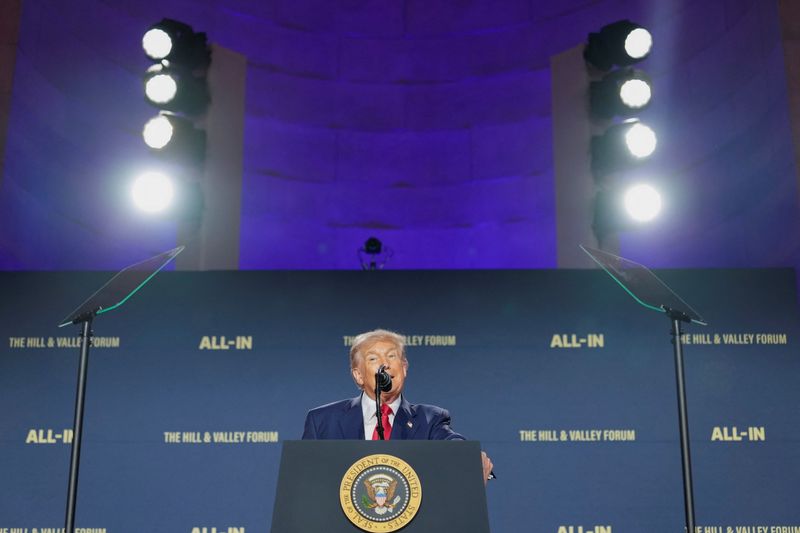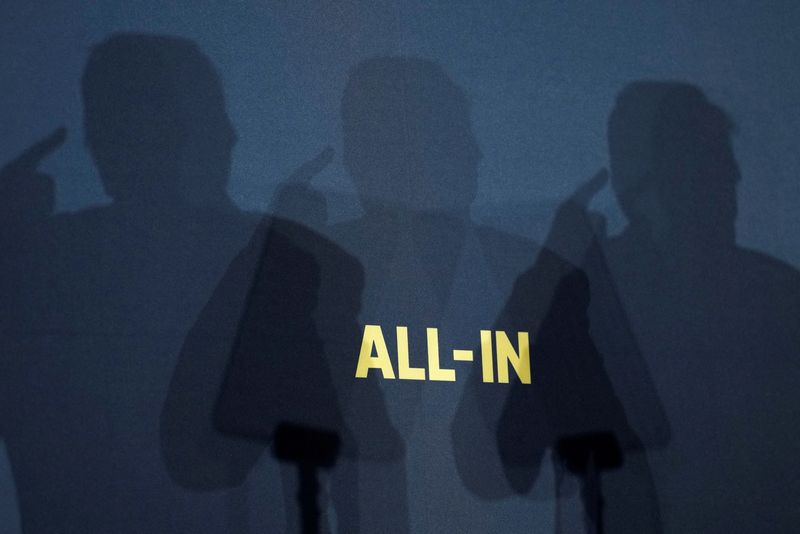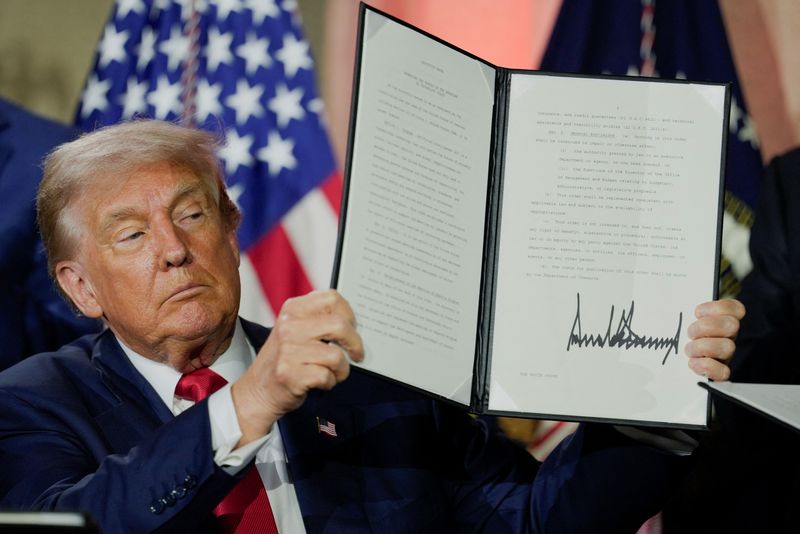By Jarrett Renshaw and Alexandra Alper
() – The administration of President Trump unveiled a fresh artificial intelligence strategy on Wednesday, designed to ease environmental regulations and significantly increase AI exports to allied nations, as part of an effort to preserve the United States’ competitive advantage over China in this vital technology.
President Donald Trump announced the plan through a speech in which he highlighted the significance of the technological competition with China, referring to it as a conflict that will shape the 21st century.
“America is the nation that initiated the AI competition. And as the President of the United States, I am here today to announce that America will emerge victorious,” Trump stated.
The strategy, featuring around 90 suggestions, advocates for the export of American AI software and equipment overseas, along with measures to address state regulations considered overly restrictive, representing a significant shift from former President Joe Biden’s “high fence” policy that restricted worldwide access to valuable AI chips.

“We must also establish a unified federal standard, rather than 50 separate state regulations for this industry in the future,” Trump stated.
Michael Kratsios, who leads the Office of Science and Technology Policy, informed reporters on Wednesday that the Departments of Commerce and State will collaborate with the private sector to “provide secure full-stack AI export solutions, encompassing hardware models, software applications, and standards, to the United States’ allies and partners globally.”
A growth in the exports of a comprehensive range of AI products may advantage leading AI chip companies like Nvidia and AMD, along with major AI model developers such as Alphabet’s Google, Microsoft, OpenAI, and Meta, the parent company of Facebook.
On Wednesday, Trump issued three executive orders that included aspects of the action plan, such as relaxing environmental regulations, setting guidelines for semiconductor exports, and aiming to reduce political bias in artificial intelligence.
President Biden was concerned that U.S. rivals, such as China, might utilize AI chips manufactured by firms like Nvidia and AMD to significantly enhance their military capabilities and threaten allied nations. The former leader, who concluded his term in January, implemented numerous restrictions on the export of AI chips from the United States to China and other countries that he believed could redirect these semiconductors to America’s primary global competitor.

Trump canceled Biden’s executive order focused on encouraging competition, safeguarding consumers, and preventing the use of AI for spreading false information. He also revoked Biden’s so-called AI diffusion regulation, which limited the amount of U.S. AI computing power certain countries could access through imports of American AI chips.
“Our advantage (in AI) isn’t something we can just sit back and take for granted,” said Vice President JD Vance during a different appearance at the event, which was hosted by White House AI and cryptocurrency advisor David Sacks along with his co-hosts from the “All-In” podcast.
“If we’re regulating ourselves into oblivion and letting the Chinese close the gap, that’s not something we should blame the Chinese for… it’s something we should hold our own leaders accountable for, for implementing poor policies that enable other nations to catch up to the United States,” Vance stated.
As stated by a high-ranking administration official, the AI strategy fails to tackle national security issues related to Nvidia’s H20 chip, which is used in AI models and was developed to closely approach previous limitations on Chinese access to AI chips.
Trump prohibited the export of H20 to China in April but permitted the company to restart sales earlier this month, leading to uncommon public criticism from other Republicans.
FAST-TRACKING DATA CENTERS
The strategy also involves accelerating the building of data centers by relaxing environmental rules and using federal land to speed up project development, including any necessary power sources.
The administration aims to create new exceptions for data centers under the National Environmental Policy Act and simplify permits through the Clean Water Act.
In January, Trump instructed his administration to create the plan.
It was previously reported that Trump is anticipated to implement further measures in the coming weeks, which will assist Big Tech in obtaining the significant amount of electricity required to operate the power-hungry data centers essential for the swift growth of AI.
Electricity demand in the United States is reaching new peaks this year following nearly 20 years of little change, driven by the rapid growth in both the quantity and scale of AI and cloud computing data centers throughout the country.
The strategy for increasing exports follows agreements announced in May, which provided the United Arab Emirates greater access to cutting-edge artificial intelligence chips from the United States, following earlier limitations due to Washington’s worries that China might obtain the technology.
(Reported by Jarrett Renshaw and Alexandra Alper; Additional reporting by Krystal Hu in New York; Edited by Chris Sanders, Jamie Freed, Mark Porter, and Diane Craft)






